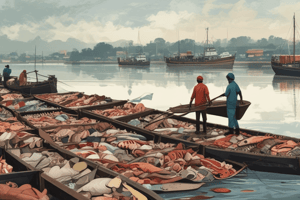Podcast
Questions and Answers
What percentage of Bangladesh's total economic output comes from exports?
What percentage of Bangladesh's total economic output comes from exports?
30%
What was the main factor contributing to the 50% increase in trade volumes in Bangladesh between 2019 and 2021?
What was the main factor contributing to the 50% increase in trade volumes in Bangladesh between 2019 and 2021?
Improved connectivity along key supply chain corridors and new international trade agreements.
What sector in Bangladesh is the biggest source of revenue?
What sector in Bangladesh is the biggest source of revenue?
Garments
What percentage of the population in Bangladesh lives below the national poverty line?
What percentage of the population in Bangladesh lives below the national poverty line?
What is a major concern related to income inequality in Bangladesh?
What is a major concern related to income inequality in Bangladesh?
What are some of the challenges that Bangladesh still needs to address for further economic development?
What are some of the challenges that Bangladesh still needs to address for further economic development?
What is the nominal GDP of Bangladesh?
What is the nominal GDP of Bangladesh?
How does Bangladesh's agricultural sector contribute to its economy?
How does Bangladesh's agricultural sector contribute to its economy?
What challenges does the agricultural sector in Bangladesh face despite improvements in crop yields?
What challenges does the agricultural sector in Bangladesh face despite improvements in crop yields?
What factors have fueled the growth of Bangladesh's GDP?
What factors have fueled the growth of Bangladesh's GDP?
In what direction has Bangladeshi trade been trending?
In what direction has Bangladeshi trade been trending?
What are some key drivers of Bangladesh's GDP growth?
What are some key drivers of Bangladesh's GDP growth?
Study Notes
Economics of Bangladesh: A Deep Dive into GDP, Agriculture, Trade, and Inequality
Bangladesh is a fascinating study in economic development from an agrarian economy to one with a growing industrial base. In this article, we examine four key aspects of its economics: the country's gross domestic product (GDP), the agricultural sector, trade and commerce, and poverty and income inequality.
Gross Domestic Product (GDP)
The global economy has shown remarkable resilience in recent years, paving the way for robust growth across many countries. Bangladesh, with a nominal GDP of $392.5 billion, stands out among these economies due to its strong potential for growth driven by robust inflation. This growth has been fueled by a variety of factors, including foreign direct investment, rising exports, and higher spending on public infrastructure projects.
Agriculture Sector
Bangladesh's agricultural sector is vital to its economy, employing more than two-thirds of its workforce. Government policies have focused on boosting productivity through modern agricultural practices and technology upgrades, leading to significant improvements in crop yields. Despite the positive progress, challenges remain, such as vulnerabilities to climate change impacts like flooding and saltwater intrusion, putting pressure on farmers' livelihoods.
Trade and Commerce
Bangladeshi trade has shown a steady upward trend. The country's trade volumes increased by nearly 50% between 2019 and 2021 due to several factors, including improved connectivity along key supply chain corridors and new international trade agreements. Exports accounted for about 30% of Bangladesh's total economic output, with garments being the biggest source of revenue. Importantly, the country ran a large balance of payments surplus.
Poverty and Income Inequality
Despite impressive economic indicators, poverty remains a persistent issue in Bangladesh. According to World Bank estimates, approximately 16% of the population still lives below the national poverty line. Additionally, income inequality is a concern. Although Bangladesh ranks among the countries with less inequality, there is still disparity, particularly between urban and rural areas.
In conclusion, while Bangladesh has made strides in economic development, there are still challenges to address, notably reducing inequality and poverty, addressing environmental risks, and fostering entrepreneurship. By focusing on these issues, Bangladesh could further solidify its position as a promising player in the global economy.
Studying That Suits You
Use AI to generate personalized quizzes and flashcards to suit your learning preferences.
Description
Explore key aspects of Bangladesh's economy including GDP growth, agricultural sector productivity, trade trends, and challenges related to poverty and income inequality. Learn about the country's economic development journey and current economic landscape.




